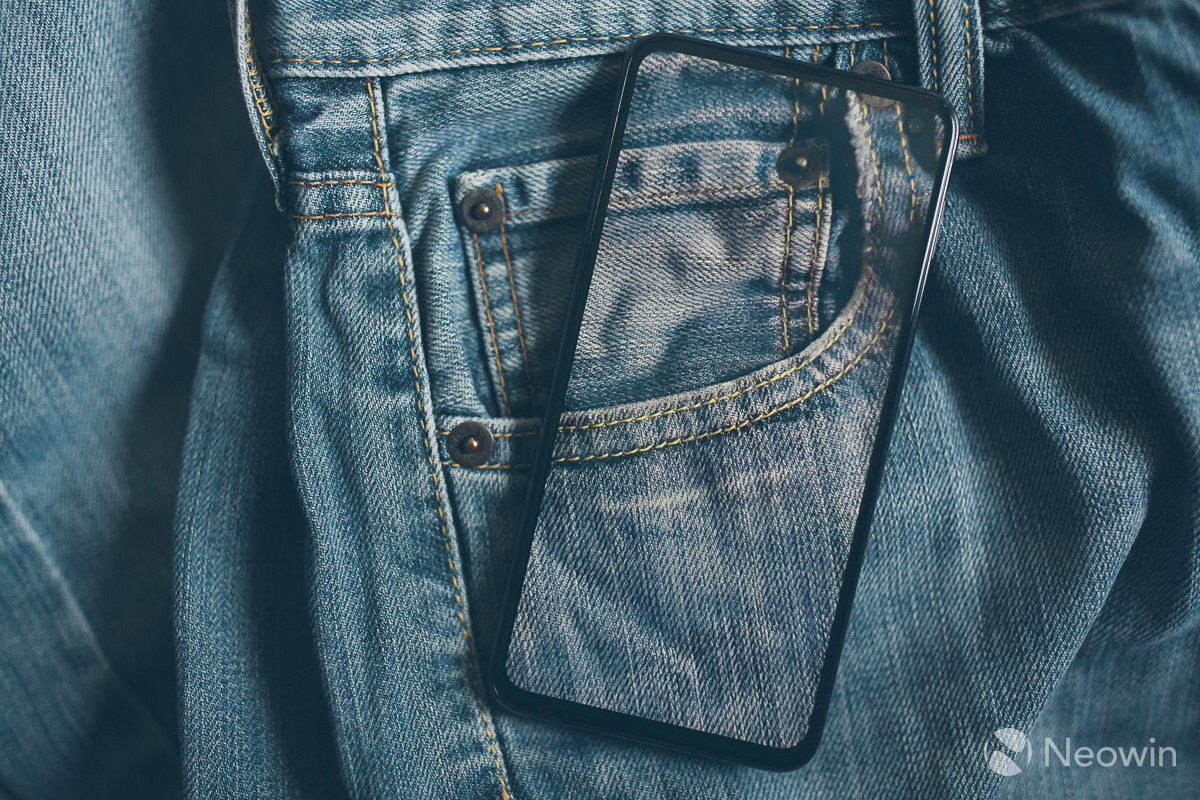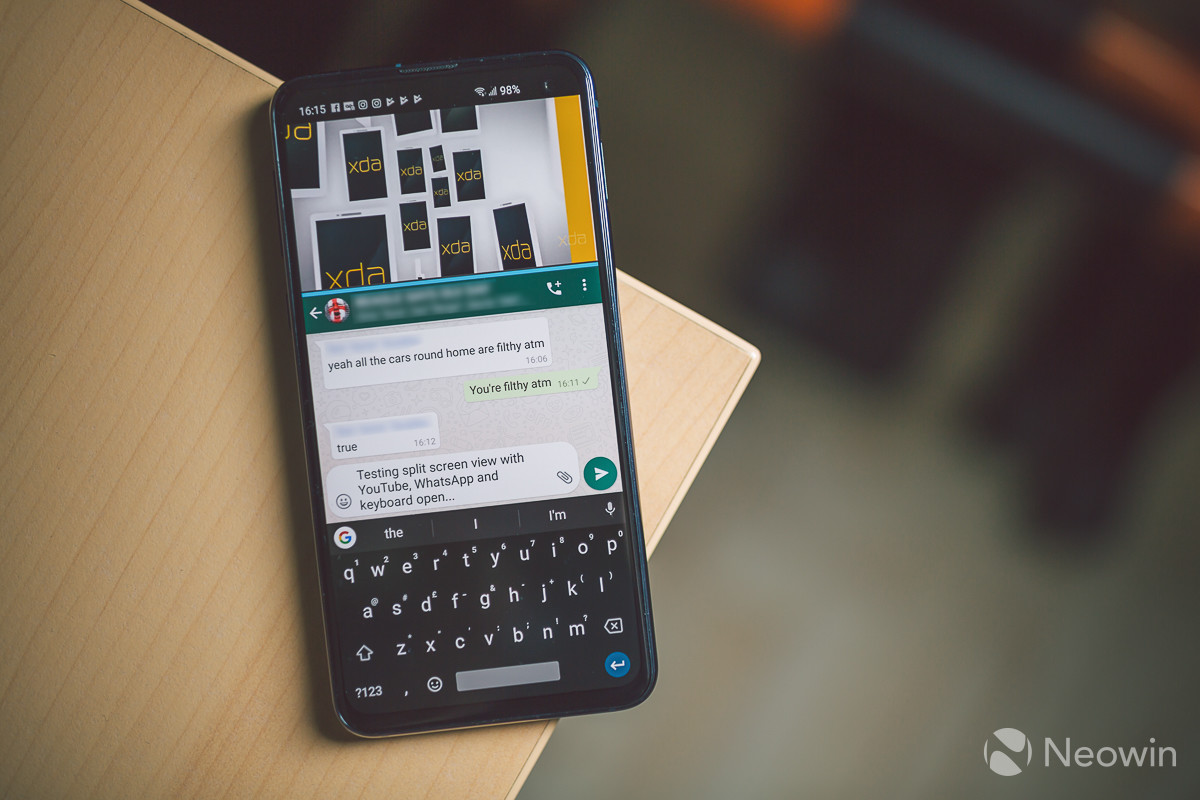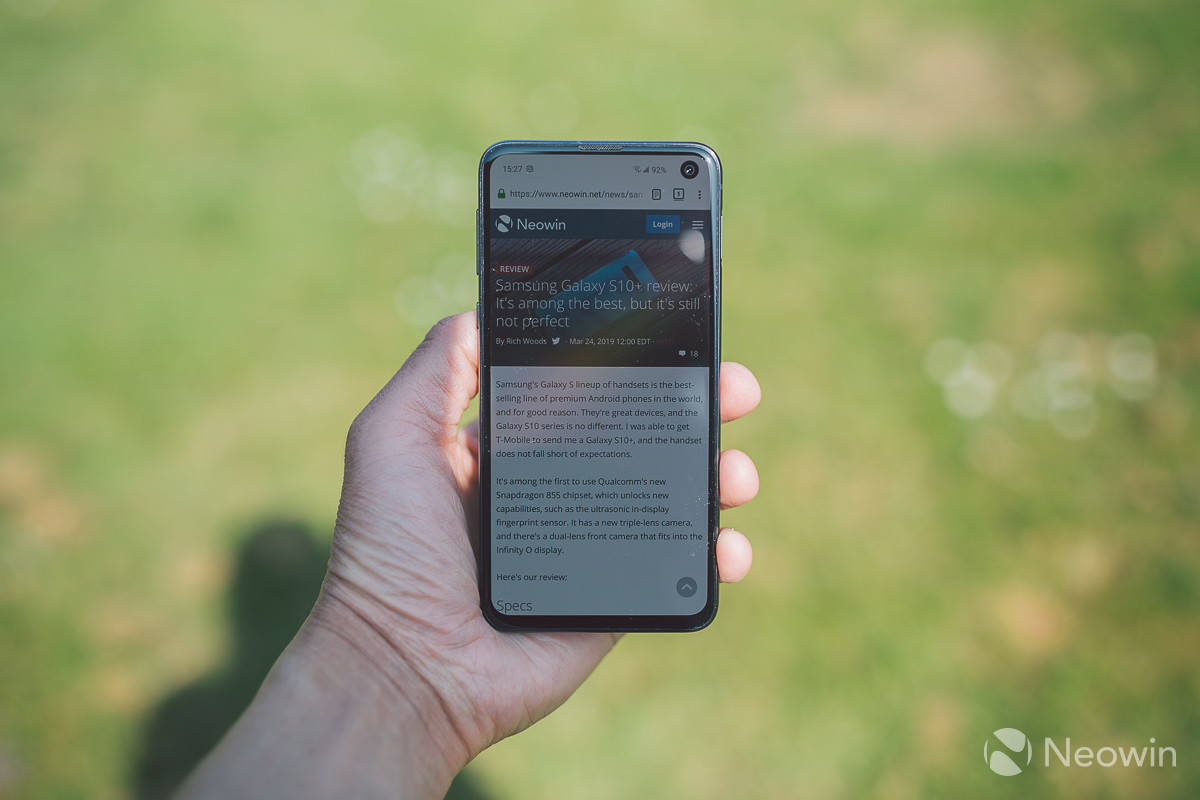Introduction
Samsung hit a home run with the Galaxy S8 series back in 2017. I reviewed the S8+ model back then, and in 2019 that phone still looks like a great buy, especially used. There are, however, a number of new features that could tempt existing owners to upgrade to the latest S10 family.
2018's Galaxy S9 offered a new 2x zoom lens and variable aperture primary camera which was a welcome addition, but the S9 series felt more like an interim update rather than a generation upgrade for anyone who had an S8 series at the time. I did actually buy an S9+ but within a month returned it as it simply did not feel any different to the S8+.
I am pleased to say that the Galaxy S10 range offers a noticeable generation jump in performance, display, camera, and ergonomics.

The competition, Huawei and Xiaomi, now sell globally in more markets than previous years, and their flagship models offer strong specs and performance to boot at often lower prices than the Samsung equivalent. All S10 versions would have to deliver strongly in all areas that matter most in order to sway potential buyers away from other brands.
Samsung has a strong marketing arm with a seemingly endless budget. It also has the low and mid-range market cornered now with the recent release of the new Galaxy A series which bridges the J and A series of old into a new segment with better specs, design and all-round pricing.
But back to the flagship and enter the S10e. It offers excellent on-paper specs, a visual design refresh, and a price that is hard to turn away from. It seems squarely aimed at a potential iPhone XR buyer, with a release price that closely matched it at £670 / €750 / $750, along with a size that is nearly identical. It might be the lowest model in the S10 line-up, but it has the hardware to carry itself alongside top end models.

To keep the price down of the S10e, there are a few differences to the S10 and S10+. The heart rate monitor, 2x zoom lens, and under-screen fingerprint scanner do not feature in the S10e. It also uses a flat AMOLED display instead of the more expensive edge curve found on the S10 and S10+. The latter may be a major selling point for many people, as often people have complained about accidental screen touches around the edges when using the larger phones.
The S10e I am reviewing today is running Qualcomm's Snapdragon 855 chipset. European buyers can only buy the Exynos 9820 version in local regions, but rest assured that real world performance differences between the two variants are largely similar.
Specifications
| Colours available |
Prism White, Prism Black, Prism Green, Prism Blue, Canary Yellow, Flamingo Pink (not available in Europe) |
| Dimensions | 142.2 x 69.9 x 7.9 mm @ 150 g |
| Build | Gorilla Glass 5 (both sides), Aluminium mid-frame, IP68 certified water/dust resistance |
| Chipset | Snapdragon 855 (Exynos 9820 in European markets) |
| GPU | Adreno 640 (Mali-G76 MP12 in European markets) |
| RAM | 8GB (limited to US market), 6GB |
| Storage | 256GB (limited to US market), 128GB, MicroSD expansion |
| Display | 5.8" AMOLED display, flat, 2280x1080 @ 438ppi |
| Cameras (rear) | 12 MP, f/1.5-2.4, 26mm (wide), 1/2.55", 1.4µm, Dual Pixel PDAF, OIS 16 MP, f/2.2, 12mm (ultrawide 123 degree fov), 1.0µm |
| Camera (front) | 10 MP, f/1.9, 26mm (wide), 1.22µm, Dual Pixel PDAF |
| Software | Android Pie 9.0 with Samsung One UI v1.1 |
| Battery | 3100mAh |
| Connectivity | USB 3.1 (Type-C 1.0), Fast wireless charging (15W), Fast wired charging (15W), Reverse wireless charging (9W), Wi-Fi 802.11 a/b/g/n/ac/ax, Bluetooth 5.0, A2DP, LE, aptX, Dual SIM |
| Audio |
Stereo speakers, Dolby Atmos, Dual mic with noise cancellation, 3.5mm headphone jack |
| Sensors |
Capacitive fingerprint (side-mounted), Accelerometer, Gyro |
| In the box | AKG tuned headphones, Type-C charging/data cable, USB-A (female) to Type-C adapter, Adaptive fast charging power block, Samsung plastic snap-on case (market dependent) |
Display
The hole-punch camera cutout has been the talking point ever since the leaks confirmed it to be true. Many thought that Samsung would bypass notches of all types in its 2019 flagship and opt for 'New Infinity' panels as per its display technology segment during the November 2018 developer conference which shows no notch and no hole-punch. But as it turns out, Samsung chose Infinity-O for the Galaxy S10, with the New Infinity featuring instead on the recently announced mid-range model, the Galaxy A80.
Owners soon found ways to adopt the hole with quirky background images for the lock and homescreen to great effect.

Amusement aside, the display itself is crisp, bright and accurate. DisplayMate rated the S10's display best in class, and since the S10e shares the same characteristics, the quality is also just as good, albeit at a smaller PPI and resolution.
Samsung has now put only two modes in the Display settings screen for choosing how the colours look. There is Vivid and Natural. Previous Galaxy flagships had additional Cinema and Photo as options. Good news is that Natural appears to be colour accurate, as can be seen below when comparing the same photo on the phone and my PC's calibrated monitor.

The panel also supports HDR10+, which gives greater dynamic range, and since the camera has the option to also record HDR10+ video, the two go hand in hand to produce excellent videos for all outdoor conditions. Of course this also means that the videos recorded using HDR+ can only be played back on supporting displays whether phone, computer or TV.
The built in video player and gallery apps can convert to standard dynamic range in the event a HDR10+ video needs to be shared to viewed on a non supported display.

The extended aspect ratio of 19:9 display makes for slightly better split-window usability over previous Galaxy phones that had an 18.5:9 display, as well as a greater media experience when playing cinematic videos. The photo above shows YouTube, WhatsApp and the keyboard open at the same time to demonstrate split-window multitasking without any compromise.
Outdoor legibility is also very good. I have seen brighter displays in sunlight, but the S10e is by no means hard to use in bright conditions. With adaptive brightness left on, the ambient light sensor which now sits under the display will know when it needs to overdrive the brightness to meet demand in such conditions.

Software
Android 9 comes out of the box with Samsung's One UI on top at version 1.1. The world is quite familiar with One UI now since the Galaxy S8 and above have been steadily updated to Android 9 over the past few months, so there is no need to delve too deeply into the software performance side of things.
In relation to the S10e, the software experience is excellent. There are no stutters or slowdowns to be seen.
Samsung has been good with monthly security updates as of late. Whilst major OS and feature updates come less often, it is slightly annoying that these are staggered across the globe when they do and sometimes are several weeks apart from one country to another. As I write this, Samsung has released the March security patch along with a number of feature enhancements to the camera. This update has yet to hit my handset with only a few days left in April, and many others around the UK with EU versions have not had it either.
Hardware
One of the differences with the S10e against its larger siblings is with the fingerprint scanner. The S10e adopts a side mounted scanner which naturally falls on an index finger or thumb as you hold the phone. It is extremely quick and accurate.

The headphone jack also remains, and the USB port and speaker grilles see little change from the S8 and S9 phones here, along with the primary microphone hole. A familiar design across the full Galaxy range.

The back of the S10e is Gorilla Glass 5 just like the S10 and S10+ (non ceramic version). This means it is a fingerprint magnet right out of the box since it does not appear to have an Oleophobic coating like the front glass does to reduce prints and smudges.
The colour might be Prism Black, but it is more of a deep ocean blue that gleams under a strong light source. It is very hard to video or photograph to do it justice, but take my word for it, it looks fantastic. The aluminium sides have a dark purple/blue shimmer to them in daylight as well. This too looks stunning.

The speakers have also been upgraded. The new top slit for the earpiece hides the left stereo speaker. In conjunction with the bottom-firing speaker, the experience is loud and clear. It's not a touch on HTC's Boomsound system or LG's resonance chamber for deep bass, but it's certainly usable for enjoying Netflix and music on the go. All S10 phones support Dolby Atmos and have custom EQ controls with Adapt Sound for connected headphones, just in-case the built in presets don't satisfy all tastes.
Camera
With the addition of the new ultra-wide camera and low light capabilities, the S10 series also introduces new EIS algorithms to electronically stabilise videos in an additional mode called Super Steady.

The camera lenses do stick out of the back glass but only by 1 mm or so. It's not major and does not rock the phone when placed flat on a table. Using a case will bring the back completely flush with any surface, if you so wish.
The camera software is quite comprehensive, especially in manual mode, but sadly there is no option to choose the ultra-wide lens in this mode.
My main criticism with the camera is that when recording video using any 60fps mode, the ultra-wide camera is not available. This framerate is only supported by the primary camera. As well as this, HDR10+ is also unavilable when recording at 60fps.
For stills, both lenses offer excellent performance. Whilst the Pixel 3 and Huawei P30 Pro offer greater low light abilities, the Galaxy S10 does an admirable job with well controlled HDR and dynamic range in varying conditions. The JPEG captures aren't overly sharpened either like on other manufacturer phones, and respond well to on-phone editing in apps like Snapseed or Google Photos.

As this is the Snapdragon variant of the S10e, the option to use the Pixel 3's Google Camera app port is available. Google's Night Sight mode is excellent at capturing detail that other camera apps simply can't manage. Samsung has a mode called Bright Night on the S10, and it works well, but loses a lot of fine detail due to heavy noise reduction being applied to the final image.
By comparison, Night Sight produces a brighter image and retains more detail at the expense of added noise. A comparison between the two night modes are included in the samples gallery below. In each of the examples, the normal mode shows how the human eye saw the scene.
Performance
The Snapdragon 855 chipset is a powerhouse and any phone using it will exceed the needs and expectations of potential buyers I have no doubt. Our own Galaxy S10+ review already has numbers for that phone using the same chipset, but how does the S10e stack up with its smaller screen, 6GB RAM and lower resolution? Let's take a quick look.
First up, Geekbench's CPU benchmark, the multi-core score was lower than the S10+ which got 11177, but the single core score is exactly the same.
AnTuTu's score below is lower than the S10+ which achieved 357611, but still close in the grand scheme of things. With 2GB more RAM, the S10+ does seem to pull ahead with benchmark scores. It would be interesting to see what the 8GB Galaxy S10e scores here, but sadly this version is limited to the US market on some carriers only.
Battery Life
I found that battery life was really quite impressive. With only 3100mAh the S10e seems to easily get through a whole day of usage, and only in extreme situations where 4G reception isn't as strong as it could be, or demanding tasks are being done seem to require a quick midday top-up even if it's via wireless charging.
Samsung Greater China's CEO hinted at the possibility of a firmware update to bring 25W fast wired charging to all S10 models. Right now the S10 phones all support just 15W fast wired charging, and around 12W fast wireless charging.
I have been using AccuBattery Pro to track battery performance over a few weeks.

Conclusion
The S10e could well be the people's favourite. The price is right, the specs are right and the real-world performance is up there with all flagships from other manufacturers. In 2019, we no longer have to worry about a sluggish high end phone, or deal breaking feature compromises just to have a smaller handset. We really do live at a time where phone buyers are spoiled for choice in every price bracket.

To keep the cost of the S10e down, Samsung did of course remove some features which have been discussed in this review. However, we still have a phone that is packed with high end specs, retains the MicroSD card slot, headphone jack, is still IP68 water and dust resistant, has fast wireless charging and might even have faster 25W wired charging with a future update.
It is a smaller phone compared to other flagships, but still packs a big punch, especially for the money.

































18 Comments - Add comment